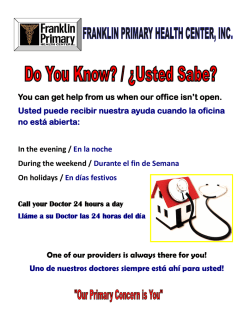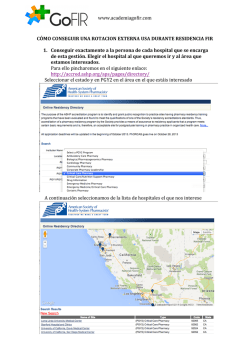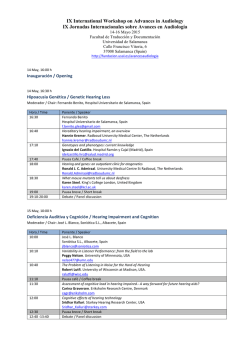
How to Prepare for a Protection Order Hearing - Frequently Asked
How to Prepare for a Protection Order Hearing Frequently Asked Questions Cómo prepararse para una audiencia de Orden de Protección - Preguntas más frecuentes This page provides you with some general information regarding how to complete the required forms in order to file for a protection order. Contact an attorney for legal advice and more complete information. Esta página le ofrece información general en referencia a cómo llenar los formularios requeridos para solicitar una orden de protección. Contacte a un abogado para que le asesore legalmente y le proporcione información más completa. Why do I need to go to court? ¿Por qué tengo que ir al tribunal? When a judge decides that the petition for a protection order should be granted based on the contents of the petition, the judge may sign an ex parte order. If this is the case, the respondent has the opportunity to request a hearing, to provide an opportunity to say why the protection order should be denied. The judge will schedule a hearing for this to happen. The judge may also sign a show cause order, requiring a hearing on the petition and affidavit submitted. If you received an ex parte domestic abuse protection order, you also have an opportunity to request the court to have a hearing. Cuando un juez decide que la petición para una orden de protección, debe concederse basado del contenido de la petición, el puede firmar una orden ex parte. Si éste es el caso, el demandado tiene la oportunidad de solicitar una audiencia, para que se le proporcione la oportunidad de expresar el por qué la orden de protección debe ser denegada. Con este motivo el juez programará una audiencia. El juez también puede firmar una orden para presentar motivos justificantes, requiriendo una audiencia sobre la petición y una declaración jurada presentada. Si usted recibió una orden ex parte de protección por violencia doméstica, usted también tiene la oportunidad de pedirle al tribunal una audiencia. How will I know when the hearing is? ¿Cómo sabré cuándo es la audiencia? Once a hearing date has been scheduled, the date and time will be provided to both parties. You will be contacted by the court staff when a date and time for the hearing has been set. In some circumstances the date and time of the hearing may be mailed to you so it is important to let the court know of any change in your mailing address so that you can receive the notice. Una vez que haya sido programada la fecha de la audiencia, la fecha y la hora se proporcionarán a ambas partes. Cuando se haya fijado una fecha y hora para la audiencia, se le contactará por parte del personal del tribunal,. En algunas circunstancias, la fecha y horario de la audiencia pueden enviarse por correo; por lo que es importante notificarle al juez de cualquier cambio en su domicilio postal, para que pueda recibir la notificación de comparecencia. What do I need to take to the hearing? ¿Qué necesito traer a la audiencia? Prior to the hearing you should gather as much information and documentation related to the events described in the original application for the protection order. This may include photos, phone records, email, and/or witnesses who can testify to these events. Antes de la audiencia usted debe recopilar la mayor cantidad de información y documentación relacionada con los hechos descritos en la solicitud original para la orden de protección. Esto puede incluir fotos, registros de teléfono, correo electrónico, y/o testigos que puedan dar testimonio de estos hechos. What do I need to do when I arrive for the hearing? ¿Qué tengo que hacer cuando llegue a la audiencia? You can contact the Clerk of the District Court to find out if you need to notify the judge’s staff that you have arrived on the day of the hearing. You can find the contact information at http://www.supremecourt.ne.gov/district-court/distclerks-addr.shtml. If you are currently working with a victim advocate, the advocate may also be able to provide this information to you. El día de la audiencia puede ponerse en contacto con el Secretario del tribunal del distrito, para averiguar si necesita notificarle al personal del juez que usted ha llegado. Puede encontrar la información de contacto en el sitio de internet http://www.supremecourt.ne.gov/district-court/dist-clerks-addr.shtml Si actualmente está trabajando con un defensor de víctimas, el defensor también podría proporcionarle ésta información. I am concerned for my safety during the hearing. Estoy preocupado por mi seguridad durante la audiencia. If you have concerns regarding your safety at the hearing, you or the advocate should contact the Clerk of the Court or a deputy sheriff in the courthouse and let them know of your concerns. Si está preocupado por su seguridad en la audiencia, usted o el defensor de víctimas deben comunicarse con el Secretario del tribunal o con el asistente del Sheriff en el tribunal y notificarles de su preocupación. What do I wear to court? ¿Cómo me visto para ir al tribunal? You should dress appropriately for the hearing. While it is not necessary to wear a dress or suit to court, you should avoid wearing extremely casual clothing such as shorts, t-shirts or clothes which contain obscene or controversial writing or graphics. Usted debe vestirse adecuadamente para la audiencia. Aunque no es necesario usar un vestido o traje para la audiencia, debe evitar el uso de ropa extremadamente casual, como pantalones cortos, camisetas o ropa que contenga escritura o gráficos obscenos o controversiales. Who are all of these people in the courtroom? ¿Quiénes son todas estas personas en la sala del tribunal? A number of people may be in the courtroom at the time of your protection order hearing. In addition to the judge, others may be at the hearing, including the court reporter, sheriff’s deputy, attorneys, the other party, a victim advocate and you. Some courts will hold several hearings during a set period of time, so the individuals involved in those cases may also be in the courtroom. Muchas personas pueden estar en la sala del tribunal al momento de su audiencia para la orden de protección. Además del juez, otros podrían estar en la audiencia, entre ellos el reportero del tribunal, el asistente del Sheriff, los abogados, la otra parte, un defensor de víctimas y usted. Algunos tribunales llevarán a cabo varias audiencias durante un período determinado de tiempo, por lo que las personas involucradas en estos casos, también podrían estar en la sala del tribunal. How do I tell the judge what happened? ¿Cómo puedo decirle al juez lo que pasó? When a judge is presented with a case, like a protection order, they need as much information as possible to make a decision. This information is provided by you when you testify or present an affidavit to the judge. It is important that you attend the hearing so that you can provide the judge all of the information that is available and necessary to either issue a final protection order or to dismiss the case. Cuando a un juez se le presenta un caso, como una orden de protección, necesita la mayor cantidad de información posible para tomar una decisión. Esta información usted la proporciona, cuando testifique o presente una declaración jurada ante el juez. Es importante que asista a la audiencia para que pueda presentarle al juez toda la información que está disponible y que es necesaria para que se expida una orden de protección final o para descartar el caso. What will happen at the hearing? ¿Qué sucederá en la audiencia? The process for the hearing may change depending on whether any attorneys are present at the hearing. If you are represented by an attorney you should talk with your attorney prior to the hearing. Your attorney should describe the hearing process. In some cases, even if an attorney is present, the judge may not allow the attorney to ask the parties questions during the hearing. Each side will be given an opportunity to testify in court, or in other words to explain to the judge why a protection order should or should not be granted. El proceso de la audiencia podría cambiar, dependiendo si hay abogados presentes en la audiencia. Si usted está siendo representado por un abogado, debe hablar con él/ella antes de la audiencia. Su abogado debe explicarle el proceso de la audiencia. En algunos casos, incluso si un abogado está presente, el juez puede negarle al abogado que haga preguntas a las partes durante la audiencia. Cada parte tendrá la oportunidad de presentar su testimonio ante el tribunal o en otras palabras, podrá explicarle al juez por qué debe o no conceder una orden de protección. Do I need to be sworn in? ¿Me podrán bajo juramento? Yes, when testifying to the court you should be sworn in. This means that the judge or bailiff should ask you to raise your hand and affirm or swear that you will tell the truth about the case. If you are not sworn in, you should ask the judge to swear you in. An example may be to say “Your Honor, may I please be sworn in at this time?” Sí, al testificar ante el tribunal, debe ser juramentado. Esto significa que el juez o el alguacil le pedirán que levante su mano y que afirme o jure que va a decir la verdad sobre el caso. Si no lo juramentan, usted debe pedirle al juez que lo juramente. Un ejemplo podría ser el decir: "Su Señoría, ¿me puede juramentar ahora, por favor?" What happens after I am sworn in? ¿Qué sucede después de ser juramentado? The judge, or an attorney if allowed, may ask you to describe the events included in the original application for a protection order. It is important that you describe the events with as much detail as possible. When describing the events in the protection order, you should also tell the judge how the events made you feel or affected you. For example, if something happened that caused you to be fearful, you should tell the judge what happened, that it caused you to be scared and how that affected your life if it did. El juez o un abogado, si se le permite, puede pedirle que describa los hechos contenidos en la solicitud original para la orden de protección. Es importante que describa los hechos con el mayor detalle posible. Al describir los acontecimientos en la orden de protección, también debe notificarle al juez cómo se sintió o cómo le afectó. Por ejemplo, si sucedió algo que le hizo sentir miedo, usted debe notificarle al juez lo que pasó, qué le causó tener miedo y cómo afectó esto su vida, si es que así pasó. Will the judge consider anything other than my testimony? ¿Considerará el juez algo más aparte de mi testimonio? Yes, if you have photographs or other evidence, including the original application for the protection order, and you want the judge to consider this evidence when making a decision, you will need to ask the judge to consider them as evidence. For example, you may say to the judge “Your Honor, I would like to have my Petition and Affidavit marked and entered as evidence.” If you have an attorney with you, the attorney can make certain that evidence is given to the judge. The judge will likely ask the other person if there are any issues or concerns, called objections, with your request. The judge will then decide whether to accept the item as evidence. You should go through this process for each item of evidence. Sí, si usted tiene fotografías u otra evidencia, incluyendo la solicitud original para la orden de protección y desea que el juez la considere al tomar una decisión, usted tendrá que pedirle al juez que la considere como evidencia. Por ejemplo, usted puede decirle al juez "Su Señoría, quisiera que mi petición y declaración jurada, se presenten como pruebas." Si su abogado está con usted, él/ella puede asegurarse de que la prueba se le entreguen al juez. El juez probablemente le preguntará a la otra parte si hay algún problema o inconveniente con su solicitud, a esto se le llama objeciones. El juez decidirá entonces, si acepta lo ofrecido como evidencia. Usted deberá repetir este proceso para cada una de las pruebas. What do I do about the messages on my phone? ¿Qué hago con los mensajes en mi teléfono? If your evidence includes text messages on your phone, you should not expect to hand the judge your cell phone and ask the judge to consider the messages as evidence. Instead, you will need to take photographs of the messages or have a printout of the messages, including the date and time it was sent, and ask the judge to consider this instead. Si su evidencia incluyen mensajes de texto en su teléfono, para pedirle al juez que considere los mensajes como prueba, no piense que debe entregarle al su teléfono celular. Más bien, usted tendrá que tomar fotografías de los mensajes o tener una copia impresa de los mensajes, incluyendo la fecha y hora en que fue enviado y pedirle al juez que los considere. Will I get my evidence back? ¿Me regresarán mi evidencia? Items entered as evidence will probably not be returned to you. Lo más seguro es que los artículos presentados como evidencia no se le regresarán. What happens after the hearing? ¿Qué sucede después de la audiencia? After both parties have had an opportunity to speak, the judge has several options. The judge may sign a final protection order, dismiss the protection order, or decide to think about it and make a decision later. Después de que ambas partes hayan tenido la oportunidad de hablar, el juez tiene varias opciones. El juez puede firmar una orden de protección final, descartar la orden de protección o decidir, que lo va a pensar y tomar una decisión más adelante. Other facts: Otros hechos: You can get a protection order even if you are not a U.S. citizen. Usted puede obtener una orden de protección, incluso si usted no es ciudadano de los EE.UU. You are free to change your mind and ask the court to dismiss the protection order. However, the judge decides whether it will be dismissed to make sure that you were not forced to change your mind. Until the judge dismisses the order it is still valid. Usted es libre de cambiar de opinión y pedirle al juez que descarte la orden de protección. Sin embargo, el juez decide si la descarta o no, para asegurarse de que no lo/la hayan forzado a cambiar de opinión. Hasta que el juez descarte la orden, ésta sigue siendo válida. If you do not speak English, ask for a court interpreter before any hearing. You may wish to bring an adult who is bilingual to assist with interpretation outside of the hearing. The court can supply an interpreter only for hearings, not to help you fill out the forms. Si usted no habla Inglés, pida un intérprete del tribunal, antes de cualquier audiencia. Usted puede traer consigo a un adulto que sea bilingüe para que le ayude en la interpretación fuera de la audiencia. El tribunal puede proporcionarle un intérprete sólo para las audiencias, no para ayudarle a llenar los formularios. You are not required to have a lawyer but having one may be a good idea, especially if you have children and you expect the other party to seek custody. If the other party has a lawyer and you do not, you may be at a disadvantage. Usted no está obligado a tener un abogado, pero el tenerlo puede ser una buena idea, especialmente si usted tiene hijos y si espera que la otra parte pida la custodia. Si la otra parte tiene un abogado y usted no, usted puede estar en una situación de desventaja. Many courts have rules prohibiting cell phones in the court house. You should not take your cell phone with you to the hearing. If for some reason you are unable to leave your phone behind, you must have the phone turned off while at the courthouse. Muchos tribunales tienen normas que prohíben los teléfonos celulares en el tribunal. No debe traer su teléfono celular a la audiencia. Si por alguna razón usted no puede dejar su teléfono, usted debe tener el teléfono apagado, mientras esté en el tribunal. This page was last modified on Wednesday, November 20, 2013 Esta página fue modificada por última vez el Miércoles, 20 de Noviembre del 2013.
© Copyright 2026


